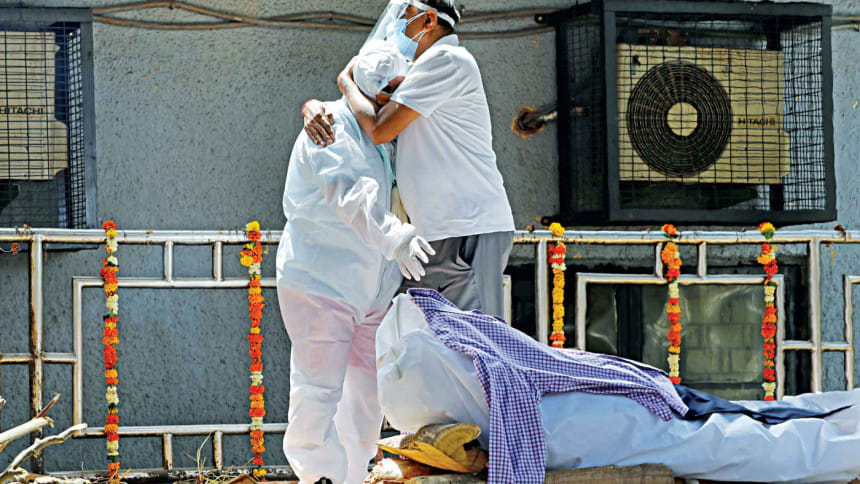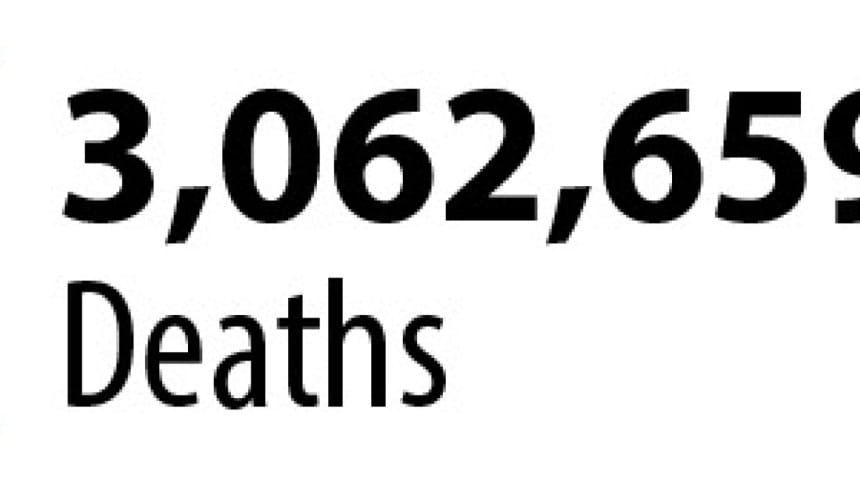Hospitals in India nearly overrun

Indian authorities scrambled to shore up supplies of medical oxygen to hospitals in the capital, Delhi, yesterday as a fast-spreading second wave of coronavirus stretched medical infrastructure to breaking point, officials and doctors said.
At least 24 patients died in a hospital in western India after a disruption to their oxygen supply caused by a leaking tank, the health minister said.
The incident in the city of Nashik, one of India's worst-hit areas, happened after the tank of gas leaked, said Rajesh Tope, the health minister of Maharashtra, the richest state, where the city is located.
"Patients who were on ventilators at the hospital in Nashik have died," Tope said in televised remarks.
"The leakage was spotted at the tank supplying oxygen to these patients. The interrupted supply could be linked to the deaths of the patients in the hospital."
The world's second most populous nation reported 295,041 new infections yesterday for the world's highest daily rise, stretching its hospitals to breaking point, officials said.
Only the United States had a slightly higher one-day rise of 297,430 cases in January, though its tally has since fallen sharply. India's 2,023 deaths were also its highest during the pandemic.
On Tuesday, hospitals in Delhi, the capital, said they had enough oxygen left for just another eight to 24 hours, while some private institutions had enough for only four or five.
The situation was so severe that some people had tried to loot an oxygen tanker, forcing authorities to beef up security, said the health minister of the neighbouring state of Haryana.
"From now, I've ordered police protection for all tankers," Anil Vij told Reuters partner ANI.
Television showed images of people with empty oxygen cylinders crowding refilling facilities as they scrambled to save stricken relatives in hospital.
"We were completely blocked out of supplies yesterday but by the end of the day we received some and it is helping us today," said Charu Sachdeva, an official at the state-run Rajiv Gandhi Cancer Institute & Research Centre in the capital.
In the northern city of Lucknow, one man said a hospital had asked him to arrange oxygen supplies for his uncle or take him away since it had run out.
Delhi, a city of 20 million people, recorded 28,395 new cases and 277 deaths on Tuesday, its highest tally since the pandemic began. Every third person tested for coronavirus proved positive.
About 80 of 142 hospitals in Delhi had no beds left for virus patients, government figures showed.
New Delhi businessman Saurabh Mittal said he called a hospital shown in a government database to have beds free, only to be told they were full up and could not take anyone.
"I told them there is online availability but they said the real-time data showed no beds," said Mittal, who had been trying to arrange treatment for a virus sufferer.
ENTRY BAN
India faces a coronavirus "storm" overwhelming its health system, Prime Minister Narendra Modi said in a national address overnight, adding that authorities were working with states and private firms to deliver oxygen with "speed and sensitivity".
Delhi, like large parts of India, let its guard down when the virus seemed to be under control, allowing big gatherings such as weddings and festivals as daily infections fell to fewer than 1,000 during the winter, health experts said.
Japanese Prime Minister Yoshihide Suga has cancelled plans to visit India and the Philippines during his country's extended holiday starting in late April amid a sharp rise in Covid-19 cases, a senior government spokesman said.
Oman will bar entry to arrivals from India, Pakistan and Bangladesh starting April 24, as part of measures to contain the pandemic, Omani state TV reported yesterday.
India has administered more than 130 million shots so far. Some local authorities have however been running short of supplies, and India has put the brakes on exports of the AstraZeneca shot.
Serum Institute of India, the world's largest vaccine manufacturer, yesterday announced more than doubling of the price of its Covid vaccine Covishield from May 1.
SII CEO Adar Poonawalla said in a statement Covishield would be at Rs 400 per dose shot to Indian state governments and Rs 600 to private hospitals.
However, the Indian government hospitals would continue to get Covishield doses at Rs 150 each as decided before the launch of India's Covid vaccination drive on January 16, reports our New Delhi correspondent.
The announcement about increase in Covishield prices came days ahead of a new expanded phase of vaccinations across India from May 1 that will include all above the age of 18.
Meanwhile, India's only domestically developed Covid-19 vaccine, Covaxin, has been found to be 78 percent effective in a second analysis of clinical trials done around the country.
"I am very pleased to state that Covaxin ... has shown the efficacy of 78% in the second interim analysis," said Balram Bhargava, the chief of the state-run Indian Council of Medical Research that has created the vaccine with Bharat Biotech.


 For all latest news, follow The Daily Star's Google News channel.
For all latest news, follow The Daily Star's Google News channel. 



Comments